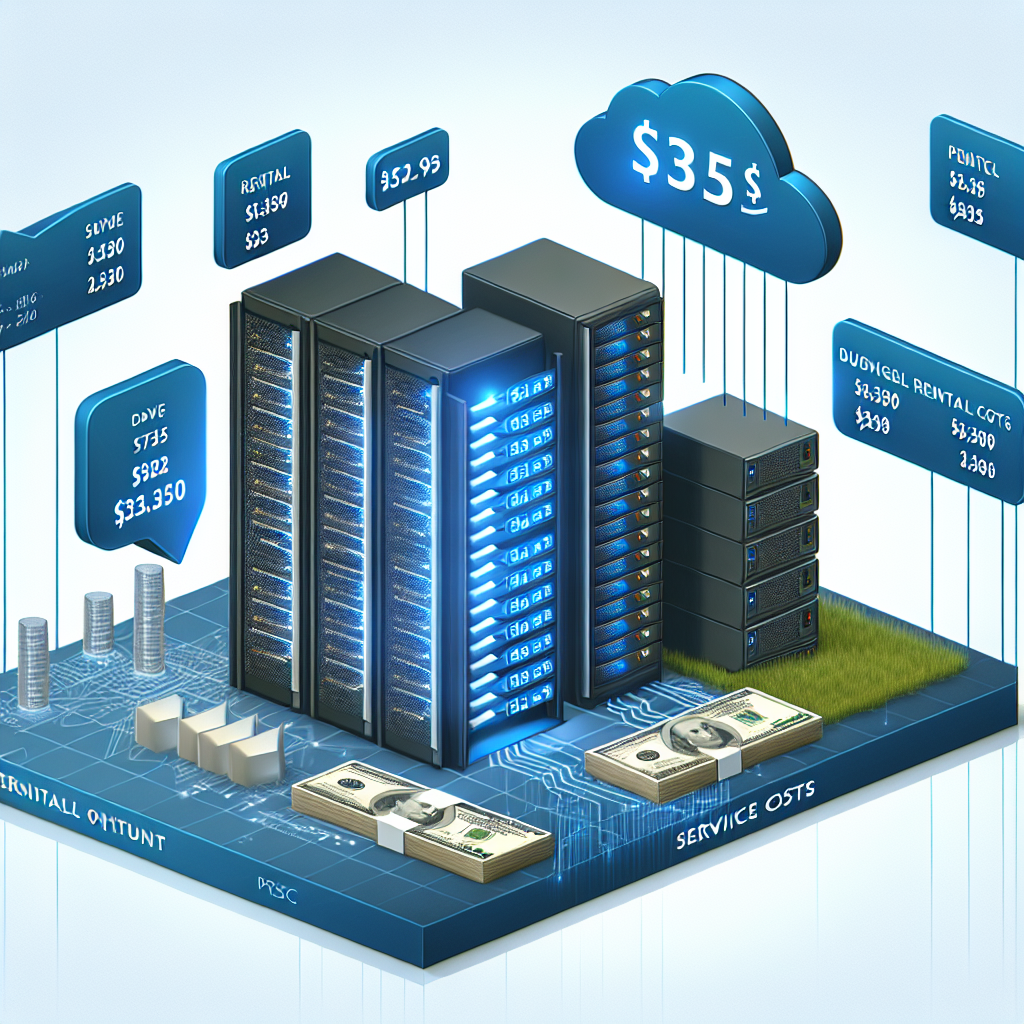Web Development Solutions: Understanding Server Rentals, Hosting Needs, and Cost Differences

What is Server Rental Called? Discover the Essentials of Server Hosting

Have you ever wondered what is server rental called? Its often referred to simply as server hosting. This service allows businesses and individuals to rent server space from a provider to host their websites, applications, and data projects. With the rise of digital technology, understanding server rentals is vital for anyone looking to establish a strong online presence. ⭐
Why Choose Server Rental?
First, why do you need to rent a server? Renting a server provides several crucial benefits:
- ⭐ Cost-Efficiency: Instead of purchasing expensive hardware, you can rent a server and only pay for what you use.
- ⭐ Scalability: Easily upgrade your rental plan to meet increasing demand as your business grows.
- ⭐ Security: Professional hosting providers offer enhanced security features that protect your data.
- ⭐ Time Saver: Focus on your business while experts manage the server maintenance.
How is a Regular Server Different from a Cloud Server?
When seeking to understand the world of server rental, its valuable to differentiate between a regular server and a cloud server. A regular server is typically a physical machine located in a data center, while a cloud server operates virtually, using multiple locations and resources efficiently. If youre unsure which is suitable for your needs, we can help determine the best plan for you. ⭐
Real Client Stories
Consider the case of a small e-commerce business that came to us for help. Initially, they were using a basic local server that couldnt handle their growing traffic. As a result, they faced frequent downtime during peak hours, leading to lost sales. After we switched them to a rented server solution, they experienced a staggering 30% increase in conversion rates. ⭐️
Another client, a local photography studio, was struggling with storing large files. They did not realize that how much does a server cost for 1 terabyte of storage might be affordable through server rental. After consulting with our experts, they successfully rented the server space they needed, enhancing their workflow and saving money in the long run. ⭐
Expert Advice for Server Management
When it comes to managing your server infrastructure, one vital piece of advice is to regularly update your software and security systems. Outdated software can expose your business to potential security breaches. Consider implementing a scheduled maintenance plan with our team, ensuring your systems are always up to date. ⭐
Another recommendation is to assess your storage needs proactively. Many clients often ask themselves, how long does a server last? A well-maintained server can last several years, provided it’s not overloaded with data. By using our service, you can ensure that your hardware is consistently optimized for peak performance.
Client Reviews
Many of our clients have shared their satisfaction with our server rental services. One client highlighted how our prompt support and maintenance significantly improved their website’s performance. "The team at Artivale was always ready to assist, and I felt valued as a customer. They transformed our server capabilities! ⭐⭐⭐⭐⭐" another client exclaimed.
Costs of Server Rental
You might be wondering, how much does server rental cost? Prices vary depending on your needs. Typically, server rental costs can begin at around 50 EUR per month for basic services, scaling up as you require more resources. For a solid understanding of what you might need, check our pricing guide at the bottom of the page. ⭐
| Type of Service | Monthly Cost (EUR) |
| Basic Server Rental | 50 |
| Medium Server Rental | 150 |
| High-Performance Server | 300 |
| Dedicated Server Rental | 500 |
| Cloud Server (1TB) | 120 |
| Backup Services | 75 |
| Advanced Security Packages | 100 |
| Software Support | 80 |
| Technical Support (Monthly) | 50 |
| Annual Maintenance Plan | 500 |
Ready to enhance your online presence with reliable and affordable IT solutions? Don’t hesitate! Call us at [email protected] or visit artivale.com to get started today!
Frequently Asked Questions
- What is server rental called? - It is commonly known as server hosting.
- Do I need a server to host a website? - Yes, you typically need a server to host your website.
- How is a regular server different from a cloud server? - Regular servers are physical, while cloud servers are virtual and distributed.
- How is a server different from a PC? - Servers are designed to manage network resources, while PCs are meant for individual users.
- How long does a server last? - With proper maintenance, a server can last several years.
- How much does a server cost for 1 terabyte? - The cost can vary, but typical rentals start around 120 EUR for cloud storage.
- How much does server rental cost? - The starting rental price is often around 50 EUR per month.
- Can I upgrade my server rental plan? - Yes, you can easily upgrade your plan as your needs grow.
- Is there customer support for server rentals? - Absolutely! Our team provides dedicated support for all rental server clients.
- What are the security measures for rented servers? - Our providers offer robust security features, including regular backups and malware protection.
Why Do You Need to Rent a Server? Understanding the Benefits for Your Business

Are you contemplating whether why do you need to rent a server? In todays digital age, effective server management is crucial. Renting a server offers numerous advantages that can propel your business forward. Let’s explore the core benefits that come with server rental. ⭐
1. Cost-Effective Solutions
One of the primary reasons businesses choose to rent servers is cost-efficiency. Purchasing and maintaining your own server infrastructure can become prohibitively expensive. With server rental, you pay a fixed monthly fee that is often significantly less than the total cost of ownership for physical servers. This means more budget for other essential areas like marketing and development. ⭐
2. Scalability
Another key benefit is scalability. As your business grows, so do its IT needs. When you rent a server, you can easily upgrade your plan to accommodate increased traffic or data demands without the headache of upgrading and installing new hardware. For instance, a startup that experiences rapid growth can quickly scale its resources to ensure seamless operations. ⭐
3. Enhanced Security
Security is a pressing concern for businesses today. Renting a server often comes with advanced security features, such as firewalls, DDoS protection, and malware detection. Hosting companies invest heavily in security infrastructure to safeguard their clients’ data. Imagine a scenario where a small business suffers a data breach due to inadequate security measures; this can lead to loss of customer trust and financial setbacks. Renting a secure server ensures your business is better protected. ⭐
4. Maintenance and Support
When you rent a server from a reputable provider, youre not just getting hardware; youre receiving a committed support team to help manage it. Regular maintenance, updates, and 24/7 technical support are often included in your rental agreement. This frees up your internal team to focus on core business functions rather than troubleshooting IT issues. Talk about peace of mind! ⭐️
5. Access to Latest Technology
Ever wondered how a server is different from a PC? Servers are specifically designed for handling multiple requests and managing network resources. By renting a server, you gain access to state-of-the-art technology without the hefty price tag associated with purchasing the latest hardware. Renting allows you to enjoy features like high-speed processors, ample storage, and advanced virtualization technologies. For example, an expanding tech company renting servers can quickly integrate innovative solutions into their existing workflows. ⚙️
6. Flexibility
Another important aspect is flexibility. You can choose the type of server that best meets your needs—be it a cloud server for ease of access and scalability or a dedicated server for enhanced performance. Whether youre a freelancer, a small business owner, or managing a large corporation, renting allows for tailored solutions to fit your specific requirements. ⭐
7. Focus on Your Core Business
By opting for server rental, you can concentrate on your core business activities while leaving server management to the experts. Take, for instance, a local bakery that recently started selling online. They can focus on creating delicious treats while their server provider manages the technical aspects of their e-commerce site. Enjoying this peace of mind can significantly boost productivity and innovation. ⭐
Client Success Stories
One of our clients, a rapidly growing online retailer, faced challenges handling increased website traffic during holiday sales. They decided to rent a server from us, allowing them to scale resources effortlessly. As a result, not only did they enjoy a smoother customer experience, but they also reported a 40% jump in sales during the holiday season! ⭐
Another customer, a non-profit organization, had budget constraints for hosting their new online platform. By renting a server, they were able to access reliable and secure hosting while staying within their budget. The organization was grateful for our support and the smooth transition to their online services. ⭐
Get Started with Us!
Are you ready to explore the perks of renting a server for your business? Artivale offers a variety of flexible server rental options tailored to suit all business types. Don’t hesitate! Give us a call at [email protected] or visit artivale.com to discover how we can elevate your IT infrastructure today!
Frequently Asked Questions
- Why should I rent a server instead of buying one? - Renting is often more cost-effective and allows for better management and support.
- How does security work with rented servers? - Security features such as encryption, firewalls, and monitoring are typically included.
- Can I upgrade my server rental plan easily? - Yes! Upgrading your plan is usually a straightforward process with your provider.
- Is technical support available for rented servers? - Absolutely! Most providers offer 24/7 technical support.
- How flexible are rental agreements? - Rental agreements can often be tailored to meet specific business needs and can range from short to long-term.
- Can I access my rented server from anywhere? - Yes, especially with cloud servers, which are designed for remote access.
- What features should I look for in a rented server? - Look for scalability, security, performance, and support.
- How do I determine my server requirements? - Assess your business needs, expected traffic, and data storage requirements to find the best fit.
- What happens if I encounter issues with my rented server? - You can reach out to technical support, who are there to help resolve any problems quickly.
- What types of businesses commonly rent servers? - Businesses of all sizes, from small startups to large corporations, frequently utilize server rental services.
How is a Regular Server Different from a Cloud Server? A Closer Look at Modern Hosting Solutions

When diving into the world of hosting solutions, it’s crucial to understand the distinction between a regular server and a cloud server. Each has its own unique advantages tailored for different business needs. So, how does a regular server differ from a cloud server? Let’s break it down! ⭐️☁️
1. Physical vs. Virtual Infrastructure
The most significant difference lies in the infrastructure. A regular server refers to a physical machine located in a data center. It handles all the hosting tasks, storing your website’s data and serving it to visitors. In contrast, a cloud server operates on virtualized servers that draw resources from multiple physical servers across various locations. This virtualization allows for greater flexibility and resource optimization. ⭐
2. Scalability and Flexibility
Another essential factor is scalability. Regular servers often have limitations on how much you can scale up or down, typically requiring hardware upgrades when traffic increases. On the other hand, cloud servers provide on-demand resource allocation. This means you can quickly add or reduce resources based on your current needs, making it perfect for businesses with fluctuating traffic patterns. For example, an e-commerce site during the holiday season benefits immensely from renting cloud server space to handle increased shopper activity. ⭐
3. Maintenance and Management
With a regular server, maintenance is your responsibility. This includes managing updates, backups, and hardware failures. This can quickly become daunting for small to medium-sized businesses without dedicated IT staff. Conversely, cloud server providers typically handle most of the maintenance. They manage security updates, backups, and technical support, allowing you to focus on more critical aspects of your business. Imagine running a restaurant and having to manage the kitchen while cooking; it’s best to have a team to assist! ⭐️
4. Cost Structure
When considering how much does server rental cost, the pricing model can vary significantly. Regular servers usually involve upfront costs as you either buy or lease the hardware. This can lead to increased expenses related to maintenance and upgrades over time. Cloud servers often operate on a pay-as-you-go system, where youre charged for only the resources you use. This flexibility can lead to better budget management and efficiency. ⭐
5. Performance and Reliability
In terms of performance, regular servers, especially those well-optimized, can deliver excellent speed and reliability. However, they could suffer from downtime if hardware fails or requires maintenance. Cloud servers enhance performance through load balancing, distributing traffic across multiple servers. This means if one server encounters issues, others can pick up the slack, ensuring uninterrupted service. ⭐
6. Disaster Recovery
Both server types provide disaster recovery capabilities, yet they differ significantly in implementation. Regular servers require you to set up backups and recovery solutions manually. If disaster strikes, you may face longer downtime while restoring data. In contrast, cloud servers typically incorporate automated backups and disaster recovery solutions as part of the package, significantly reducing recovery time and ensuring business continuity. It’s like having insurance—better to be prepared! ⭐
Real Client Insights
Consider this scenario: A local gym decided to switch from traditional servers to cloud servers to better manage their online membership system. Initially, they experienced slow processing times and limited online access with their regular server setup. After migrating to a cloud solution, they noticed increased speed and efficiency, allowing members to access their accounts without any downtime. Their member satisfaction increased dramatically! ⭐️♀️
Moreover, a nonprofit organization utilizing a regular server faced repeated outages that hindered their online fundraising campaigns. After transitioning to a cloud server, they reported seamless operations, especially during critical campaigns, and they could gather donations without interruptions. Their donations increased significantly due to enhanced user experience. ⭐
Choosing the Right Solution for You
When considering which server solution is right for your business, evaluate your needs. Do you require flexibility, scaling, and minimized maintenance? A cloud server might be the best fit. However, if you prefer a more hands-on approach with dedicated hardware, a regular server could work. Determining how a server is different from a PC can also influence your decision as servers are specifically optimized to manage multiple requests and run complex applications. ⭐️
No matter your choice, Artivale can guide you through the intricacies of server rentals, providing tailored solutions to match your business needs. Interested in exploring your options? Call us at [email protected] or visit artivale.com today!
Frequently Asked Questions
- What is a regular server? - A regular server is a physical machine that dedicatedly manages hosting tasks.
- What is a cloud server? - A cloud server is a virtual machine drawing resources from multiple physical servers for hosting.
- Which server is more scalable? - Cloud servers offer more flexibility and scalability compared to regular servers.
- How does maintenance compare between the two? - Regular servers require you to manage maintenance, while cloud servers are typically managed by the provider.
- Which server solution is cost-effective? - Cloud servers generally operate on a pay-as-you-go model, making them more budget-friendly long-term.
- Are there reliability differences? - Yes, cloud servers use load balancing for better reliability, minimizing the risk of downtime.
- How do disaster recovery measures differ? - Cloud servers typically offer automated backups, while regular servers require manual setup for recovery.
- Is performance better on one than the other? - Both can provide excellent performance, but cloud servers offer added benefits through distributed computing.
- Can cloud servers support high traffic? - Yes! Cloud servers can quickly scale resources to handle increased traffic effectively.
- How do I decide which solution is for me? - Assess your needs for flexibility, control, and budget to determine the best fit.
Submit your details in the form and our team will personally get in touch with you within the next business day to discuss your needs
